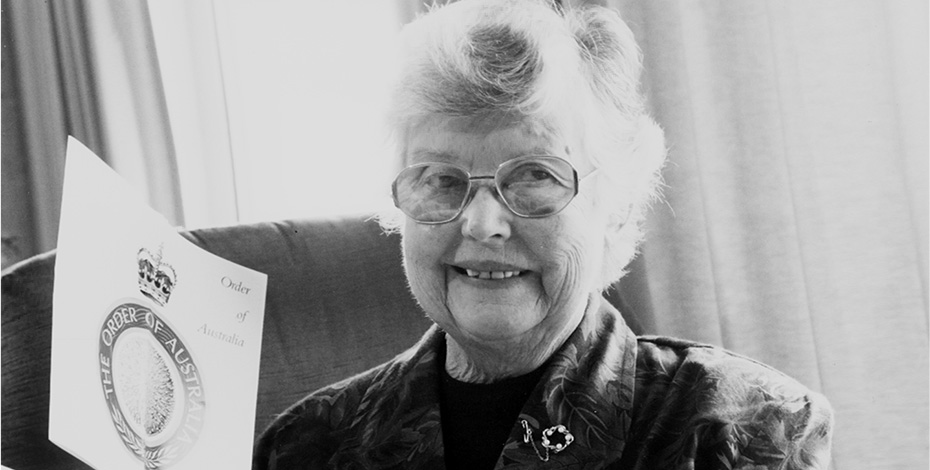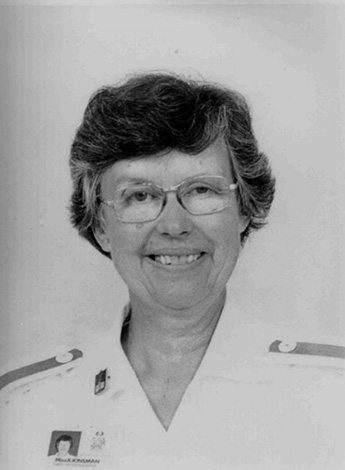
Vale Alison Kinsman, 1928–2023

TRIBUTE Physiotherapist Alison Kinsman had an enormous impact on the profession in South Australia, particularly at the Royal Adelaide Hospital. She is remembered by friends and colleagues for her lifelong dedication, vision and generosity writes Naomi Haensel.
Alison Kinsman AM, a giant of South Australian physiotherapy, died on 30 April 2023.
She was 95 and had been in ill health for a few months prior.
In her role as a long-time Director, Physiotherapy at Royal Adelaide Hospital, she mentored a generation of physiotherapists who regarded her with the utmost respect, despite referring to her unofficially as ‘Kinny’ instead of ‘Miss Kinsman’, as was the accepted practice of the day.
Many of these were at her Service of Thanksgiving, held on Friday 19 May at Pilgrim Uniting Church, Adelaide and contributed memories of her to the eulogy given about her working life.
According to her headmistress at Methodist Ladies’ College, Alison was not ‘university material’ but this assessment only spurred her on and she graduated in 1949 with a Diploma in Physiotherapy from the University of Adelaide, where she had come under the influence of Miss Elma Casely MBE, Head of School, and her high standards of treatment and care.
Her initial work experience in 1950 was at the Adelaide Children’s Hospital before succumbing to polio.
On recovering and returning to work, Alison became the first physiotherapist allocated full-time to the Spastic Centre, operated by the Crippled Children’s Association of South Australia.
In the mid-1950s she went to work at the Royal Hobart Hospital, prior to embarking on travel to and work in Britain.
Her first job in London was at the Royal London Homeopathic Hospital—an ‘interesting experience’, supposedly.
Her next appointment was at the University College Hospital, where she is said to have flourished. Not surprisingly, she always supported her staff to spread their wings overseas too.
In the time-honoured fashion of Australian physiotherapists, overseas work was interspersed with travel in the Northern Hemisphere.
There was a touring holiday in Scotland.
It was summer—so raining continuously—and with her companion at the wheel of their hire car, heater turned on to full, Alison draped their damp washing over her legs, rotating items to get them dry.
On her return to Australia in 1959, she commenced work at the Royal Adelaide Hospital (RAH), where she remained until her retirement in 1986.
During her early years at the RAH she was responsible, as the sole physiotherapist, for establishing the physiotherapy service to the new paraplegic units, both at the RAH and at the Morris Hospital—the latter in an old corrugated iron building.
She became the Supervising Physiotherapist of the rehabilitation wards at Northfield and Morris Hospitals in 1963, thus beginning a decades-long association with what is now Hampstead Rehabilitation Centre.
This was followed, 18 months later, by her appointment at the RAH as Assistant Chief Physiotherapist and then, early in 1966, Chief Physiotherapist (later re-named Director, Physiotherapy), a position she held for 20 years.
During those 20 years, her commitment to her profession was evident.
Alison was a long-time member and chair of the SA Hospitals Department Physiotherapy Advisory Committee, advising the Director-General of Medical Services on matters relating to physiotherapy services.
These included recommendations on the provision of physiotherapy services and on the use of non-physiotherapists in areas of shortage, such as rurally and in mental health; forward planning for the physiotherapy workforce, leading to increased student intake in the mid-1970s; advocacy for occupational therapy and speech pathology, which at the time had no undergraduate training in South Australia; recommendations that led to the establishment of a Graduate Diploma in Manipulative Therapy; and planning of physiotherapy departments in new hospitals, including Modbury Hospital and Flinders Medical Centre.
The education of physiotherapists was recognised by Alison as key to the future development of the profession.
In addition to the very close and supportive relationships she developed with successive Heads of School, Alison was a long-time member and chair of the School of Physiotherapy Advisory Committee at the SA Institute of Technology.
In addition, she was a member of the Julia Farr Centre board of management and an elected member of the Physiotherapists Board of South Australia.
Post-retirement she was a member of the Hampstead Rehabilitation Centre management committee, bringing her rehabilitation and management experience to this body.
She spent much time in retirement compiling the early history of the RAH Physiotherapy Department and funded its publication.
Alison made an active contribution, spanning many decades, to the APA.
She served as South Australian Branch committee member, honorary secretary, president-elect and president.
As an invited member, then honorary secretary and, ultimately, chair of the Physiotherapy Society of South Australia, a precursor to the establishment of the Australian College of Physiotherapists, Alison was in at the beginning of the effort to develop the academic foundation for physiotherapy research in Australia, contributing several papers to the Society’s scientific meetings.
In addition, she served on the Continuing Education Committee, was a federal delegate to the national House of Delegates, helped organise two national congresses and was a member and trustee of the Elma Casely Fund.
Not slowing down in retirement, she remained a trustee of this fund for many years and was also a facilitator and active member of the SA Retired Physiotherapists Group.
In 1998, Alison’s contribution to the APA was recognised when she was awarded Life Membership.
Following her retirement, Alison continued to make a ‘hands on’ contribution to various community organisations by providing time and leadership to the Motor Neurone Association and the Neurological Resource Centre and as patron of volunteers, Hampstead Rehabilitation Centre.
Raising community awareness; educating patients, carers and health professionals; raising funds for equipment and research; and assisting with the practical needs of carers were central to Alison’s visions for these organisations and she had the skills to deliver on them.

Miss Kinsman
Among the many charities she supported, Alison was also patron of, and regular substantial contributor to, the RAH Physiotherapy Centenary Fund, which is used, among other purposes, to award the Alison Kinsman AM Physiotherapy Research Grant.
In parallel to her extensive professional involvement, Alison offered her skills, time and energy to the Uniting Church, where she practised her lifelong Christian faith.
In 2001, Alison was most deservedly awarded Membership in the Order of Australia for services to physiotherapy, the education of physiotherapists and services to the Uniting Church of Australia.
In the time leading up to and following Alison’s death, many people who had the privilege of being one of her RAH physiotherapists shared their memories and opinions of her.
There were many common threads: diligence, professionalism, interpersonal skills, vision, diplomacy, a capacity to see the potential in others and to encourage them to spread their wings, generosity and wisdom.
Almost all who had kept in touch with her over recent years told of her response to any question about herself—‘There’s not enough time to talk about me; tell me about what you’ve been doing.’
It’s not surprising that the broad community of physiotherapists, physiotherapy educators, hospital administrators and allied health colleagues from Alison’s era is united in its gratitude for her leadership, vision and dedication.
© Copyright 2024 by Australian Physiotherapy Association. All rights reserved.





